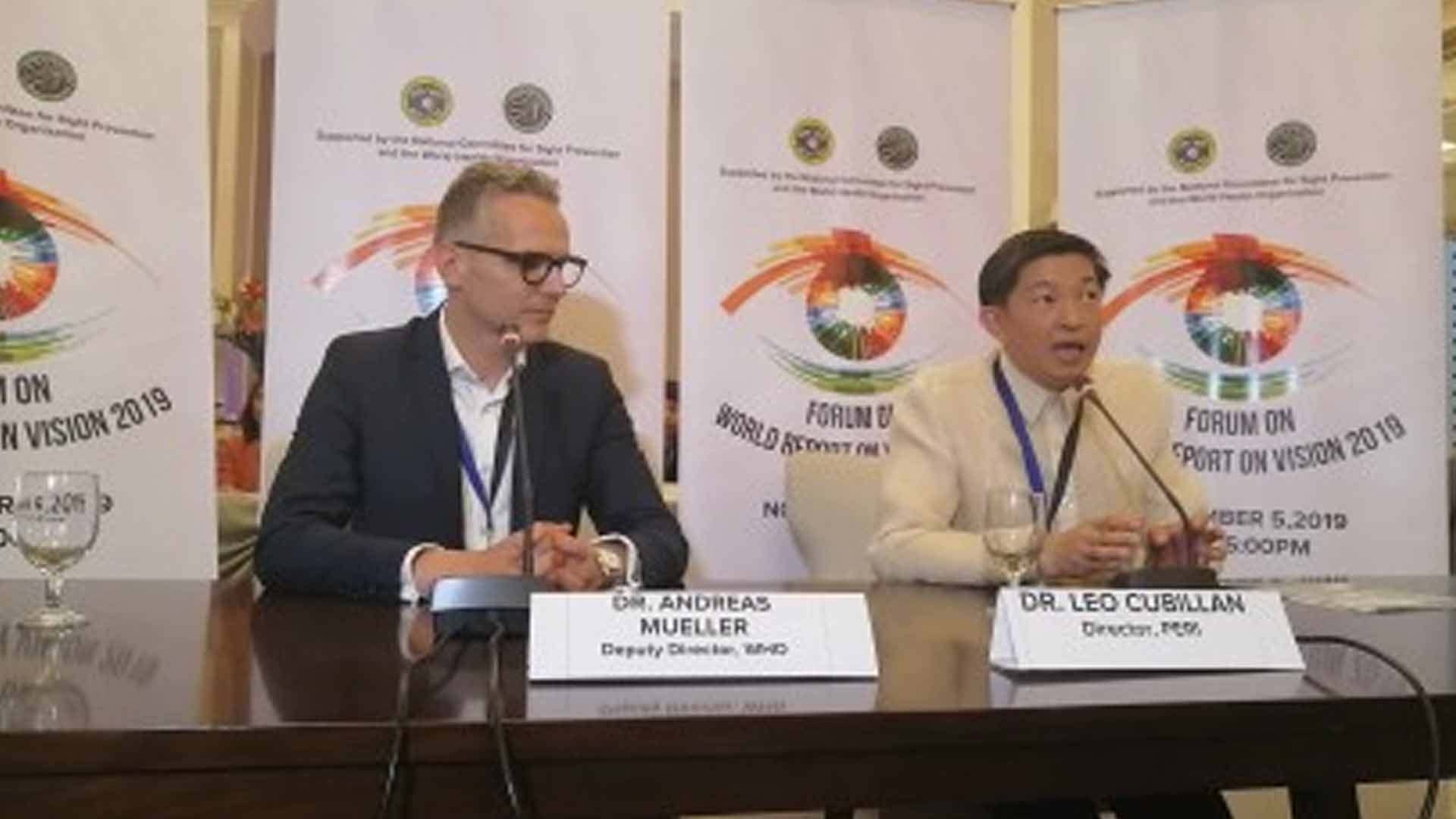The Department of Health, together with the World Health Organization (WHO) and the Philippine Eye Research Institute (PERI), on Wednesday, pushed for the provision of comprehensive eye care services among Filipinos under the Universal Health Care (UHC) law.
DOH said vision impairment is rampant among Filipinos, citing a report from the World Health Report on Vision that an estimated 2.2 billion people suffer from vision impairment including near/farsightedness, glaucoma, cataracts, and error refractions which decreased for the past years.
WHO Regional Adviser for Blindness, Dr. Andreas Mueller, said about 1.1 billion or more than half of those suffering from eye vision problem can be treated, while vision loss can be prevented.
“That’s why WHO is very dedicated to this issue because so much of blindness and vision loss is unnecessary if we treat people, if we find it early enough and treat them appropriately we can stop people from going blind in most cases,” Mueller said.
“The problem is that most people (who) have vision problems are older people. Mainly, older people develop cataracts or needing reading glasses and other adult problems that can cause vision loss,” he added.
Mueller said the whole health system, including doctors, nurses, and barangay health workers, can be part in the provision of eye care among people who possibly suffer from eye impairment.
“The whole health system can be better trained and featured across the whole health system. There’s a need to be someone who’s available, understands eye care and could identify the vision problem subject to the referral,” he added.
Meanwhile, PERI Director, Dr. Leo Cubillan, said the DOH is pushing eye health through a primary care provider network that will be institutionalized under the UHC to further cater comprehensive eye services to the people.
“With this burden of disease in the country, it becomes relevant to look into what programs the DOH has and maybe we want to see what the world is working on in terms of their World Vision report,” Cubillan said.
Visual impairment
Cubillan also cited the findings in the 2018 Philippine Eye Disease Study that cataract remains the main cause of the visual impairment in the Philippines, while glaucoma and diabetic retinopathy were present among patients with no visual impairment.
To prevent eye diseases among Filipinos, PERI said it has spearheaded the National Vision Screening Program (NVSP) with the DOH and the Department of Education (DepEd) to screen all kindergarten pupils entering the Filipino schools’ system at age 5 to 6 years old to detect errors of refraction and amblyopia.
“The development of error of refraction is multifactorial, and it’s a coincidence that if you look at the kindergartens, around 10 percent of them actually could not read what’s on the blackboard. That’s the reason why President Duterte signed into law [the mandatory eye screening] for all the kindergarten pupils on July 31, 2019,” he said.
Responsive eye care
The DOH said it is eyeing to capacitate health facilities responsive to the delivery of appropriate eye care services among Filipinos.
Dr. Maria Sylvia Uy, head of DOH’s Prevention of Blindness Program, said the agency is working with PhilHealth to include eye care in the coverage of health services.
“According to Philhealth, so far, the resources cannot be able to supply needed eyeglasses to all Filipinos, that’s why we chose to prioritize the kindergartens and senior citizen,” she said.
Uy said visual impairment has a negative impact on academic performances of the pupils while senior citizens are prone to accidents that there is a need to improve their eye sights.
“It has to be integrated within the local health system so that in the rural health unit, the services are there bringing easy access and referrals to the ophthalmic specialty centers to prevent eye problems,” he said.
He also said the ratio of ophthalmologists in the country is insufficient, however added that they “are training health workers while the DOH is working in several areas in the country to equip the government hospitals to eye care services.”
Uy added that the DOH is currently involving the local chief executives of local governments in the community health care program.
“They are encouraged to be part of the community health care team wherein they could draft local ordinances or a resolution to support the program. That means they allocated funds for the programs including the provision of eyeglasses and capacitate local hospitals [even cataract surgeries] which is prevalent among us,” Uy said.
Uy added that under the UHC, the service delivery network requires to address health care problems from the local government to the national level. (PNA)








